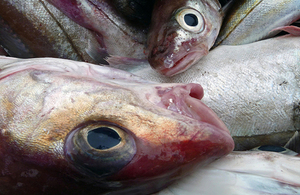Annual UK fishing industry report published today
The Marine Management Organisation (MMO) publishes its annual UK Sea Fisheries Statistics 2013 report today.

Landings of demersal fish (such as haddock) increased by 10 per cent between 2012 and 2013 to the highest level seen for over ten years.
The report - available in full online - includes detailed figures on the UK fishing fleet, the number of fishermen, the quantity and value of landings, international trade and the state of key fishing stocks.
The report highlights that in 2013:
- UK vessels landed 624,000 tonnes of sea fish (including shellfish) into the UK and abroad with a value of £718 million - a 1 per cent decrease in quantity and a 7 per cent decrease in value compared with 2012.
- Landings of demersal fish (such as haddock, cod and whiting) increased by 10 per cent between 2012 and 2013 to the highest level seen for over ten years. Landings of haddock - the highest caught demersal species – have risen by a third in two years to 40,000 tonnes. Pelagic (such as mackerel) and shellfish landings fell by 3 and 6 per cent respectively between 2012 and 2013.
- Pelagic fish accounted for the largest share in terms of landings (47 per cent) but the lowest share in value (25 per cent). Demersal fish accounted for the largest share in terms of value (38 per cent), slightly higher than shellfish (37 per cent).
- The Scottish and Northern Irish fleets caught mainly pelagic fish. Demersal fish account for the highest share of the English fleet’s catch and shellfish are predominately caught by the Welsh fleet.
- The UK fishing fleet fell from being the sixth to the seventh largest in the EU in terms of vessel numbers, with the second largest capacity and fourth largest power. Around 6,400 fishing vessels were registered with a total capacity of 197,000 GT and total power of 798,000 kW.
- 68 per cent of the quantity landed by the UK fleet was caught by vessels over 24 metres in length; 4 per cent of the total number of UK vessels. These vessels tend to catch lower value pelagic fish and their share of the value of the UK catch is 54 per cent.
- Around 12,150 fishermen were reported as active in the UK. Of these, around 1,800 were part-time.
- Scottish vessels accounted for 59 per cent of the quantity of landings by UK vessels while English vessels accounted for 31 per cent.
- Peterhead remained the port with the highest landings - 113,000 tonnes with a value of £112 million. This is more than double the levels seen in the second most active port, Lerwick.
- Brixham had the highest quantity of landings in England - 13,500 tonnes with a value of £24 million - closely followed by Plymouth with 11,600 tonnes at a value of £13.5 million.
- 739,000 tonnes of fish and processed fish were imported, 2 per cent lower than in 2012. Over the same period, exports decreased by 3 per cent to 453,000 tonnes.
- World figures for 2012 showed that China caught the largest amount of fish, 14.0 million tonnes. Indonesia had the second largest catch at 5.4 million tonnes, followed by the United States of America (5.1 million tonnes) and Peru (4.8 million tonnes).
The full report, and more detailed supplementary tables, can be seen on the MMO website.
MMO Acting Chief Executive, Andy Beattie, said: “We are pleased to see that demersal species have increased to the highest level seen for more than a decade. Landings of pelagic species have fallen slightly, but we continue to work closely with fishermen to help keep fisheries open for as long as possible, while ensuring stocks are maintained for the future.
Notes to editors
The Marine Management Organisation (MMO) regulates the seas around England, including the management of fisheries.
The MMO has the difficult balancing task of ensuring that stocks are managed throughout the year to maximise fishing opportunities for the UK industry, whilst ensuring that stocks are not overfished and the UK government and taxpayer does not have to pay steep penalties.
We are continually working with the fishing industry to improve day-to-day management with accurate catch limits and forecasts that secure longer fisheries, while safeguarding the welfare of fish stocks.
The MMO, through the European Fisheries Fund (EFF), awards millions of pounds every year to the fishing industry and coastal communities.
Further information is available from our website at www.gov.uk/mmo.